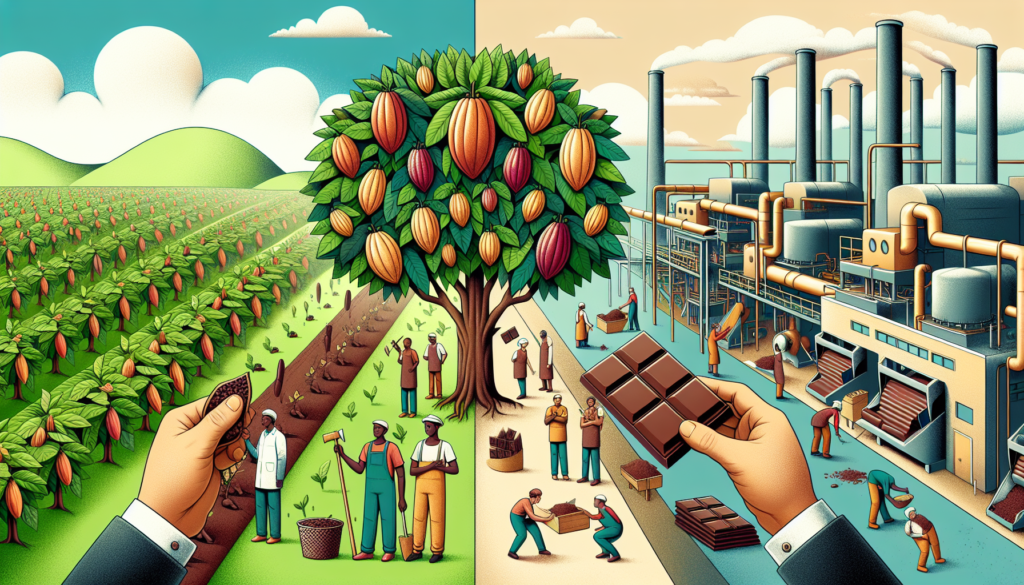Imagine indulging in a delectable piece of chocolate, savoring its rich flavor and smooth texture, without a hint of guilt. In this article, we take a close look at the ethics behind everyone’s favorite sweet treat. We delve into the world of fair trade and sustainable practices, uncovering the efforts made by chocolate producers to ensure ethical sourcing of ingredients and the environmental impact of their operations. Join us on this journey as we explore the delicious side of ethical chocolate.

Understanding Fair Trade
Fair trade is a concept that aims to ensure producers and workers, especially in developing countries, receive fair compensation for their labor and have safe working conditions. It promotes ethical business practices and encourages the improvement of social, economic, and environmental standards in global trade.
Definition of Fair Trade
Fair trade can be defined as a global movement that advocates for better trading conditions and promotes the rights of marginalized producers, particularly in developing countries. It focuses on providing fair prices, empowering farmers and workers, promoting sustainability, and ensuring transparency throughout the supply chain.
Certification Process for Fair Trade Chocolate
Certification is an essential aspect of the fair trade system as it authenticates the adherence to fair trade standards. For chocolate to be labeled as fair trade, it must go through a rigorous certification process. This process involves an independent certifying body verifying that the chocolate meets specific criteria, such as fair prices, no child labor, sustainable production, and ethical treatment of workers.
The Benefits of Fair Trade Chocolate
Choosing fair trade chocolate not only satisfies your sweet tooth but also positively impacts the lives of farmers, promotes sustainable agriculture, reduces child labor and exploitation, and supports gender equality.
Improving the Lives of Farmers
Fair trade chocolate ensures that farmers receive fair prices for their cocoa beans, providing them with a stable income to support their families and communities. By eliminating middlemen and promoting direct trade, fair trade enables farmers to escape the cycle of poverty and invest in education, healthcare, and infrastructure in their communities.
Supporting Sustainable Agriculture
Fair trade encourages environmentally sustainable agricultural practices. Certified farmers are required to follow strict guidelines that promote biodiversity, protect natural resources, and minimize their impact on the environment. By prioritizing sustainable agriculture, fair trade chocolate contributes to the preservation of ecosystems and the long-term viability of farming systems.
Reducing Child Labor and Exploitation
One of the grave issues in the cocoa industry is the prevalence of child labor and exploitation. Fair trade certification prohibits the use of child labor and ensures that workers are treated with dignity and respect. By choosing fair trade chocolate, consumers actively contribute to the reduction of child labor and support initiatives that provide education and better working conditions for cocoa-producing communities.
Promoting Gender Equality
Fair trade aims to empower women in cocoa-producing regions by promoting gender equality. It ensures that women have equal access to resources, training, and decision-making processes. By actively supporting fair trade chocolate, you contribute to breaking down gender barriers and fostering more inclusive and equitable societies.
Challenges Facing Fair Trade Chocolate
While fair trade chocolate brings numerous benefits, it also faces its fair share of challenges that hinder its widespread adoption and impact.
Limited Market Share
Despite an increase in consumer awareness, fair trade chocolate still accounts for a relatively small market share compared to conventionally produced chocolate. The availability and accessibility of fair trade chocolate can vary across regions, limiting the consumer’s ability to make ethical choices.
Pricing Issues
The fair trade system ensures that farmers receive fair prices for their cocoa beans, which often results in higher retail prices for fair trade chocolate. This higher cost can be a deterrent for budget-conscious consumers or those unaware of the true value of fair trade practices. Educating consumers about the importance of fair prices and the impact on the lives of farmers is crucial in addressing this challenge.
Quality and Taste
In the past, fair trade chocolate has sometimes faced criticism for its perceived lower quality and taste compared to conventional chocolate. However, strides have been made to improve the quality of fair trade chocolate, and many Fair Trade Certified brands have received accolades for their taste and craftsmanship. Consistent efforts to enhance quality will further encourage consumers to choose fair trade chocolate without compromising on flavor.
Sustainable Practices in Chocolate Production
Chocolate production has a significant environmental impact due to the cultivation of cocoa beans, the use of pesticides, and the carbon emissions generated during processing and transportation. To mitigate these impacts, sustainable practices are essential.
Environmental Impacts of Chocolate Production
The cultivation of cocoa beans often involves clearing land, leading to deforestation, habitat loss, and biodiversity decline. Additionally, traditional cocoa farming relies heavily on agrochemicals, contributing to soil erosion, water pollution, and the degradation of ecosystems. Sustainable practices aim to minimize these negative impacts through responsible land use, organic farming methods, and the conservation of critical habitats.
Implementing Sustainable Farming Methods
Fair trade certification requires farmers to adopt sustainable farming methods, such as organic agriculture, agroforestry, and integrated pest management. By promoting biodiversity, reducing chemical inputs, and enhancing soil health, these practices help preserve ecosystems, protect the health of farmers and consumers, and create resilient farming systems capable of withstanding climate change.

The Role of Certification Programs
Certification programs play a vital role in ensuring the credibility and effectiveness of fair trade and sustainability standards. They provide a framework for assessment, guidance, and monitoring of ethical practices within the chocolate industry.
Overview of Different Certification Programs
Several certification programs exist to verify the adherence to fair trade and sustainability standards in the chocolate industry. Some well-known programs include Fairtrade International, Rainforest Alliance, and UTZ. Each program has its specific criteria, but they all share the common goal of promoting ethical practices and supporting the well-being of farmers and workers.
Evaluating the Effectiveness of Certification
Measuring the real impact of certification programs is essential to ensure their effectiveness and drive continuous improvement. Research and evaluation studies help assess the benefits brought about by fair trade and sustainability certifications, identify areas for improvement, and encourage accountability among brands, producers, and consumers.
Corporate Social Responsibility in the Chocolate Industry
Corporate social responsibility (CSR) refers to a company’s commitment to conducting business in an ethical and sustainable manner. In the chocolate industry, CSR initiatives play a crucial role in fostering positive change.
Implementing Ethical Sourcing Policies
Leading chocolate companies have recognized the importance of ethical sourcing and have implemented policies that reflect their commitment to fair trade and sustainable practices. They establish long-term relationships with farmers, provide fair prices, and invest in initiatives that empower communities. By engaging in ethical sourcing, these companies strive to create a more equitable and sustainable cocoa industry.
Supply Chain Transparency
Transparency throughout the supply chain is crucial to ensure fair trade and sustainability. Transparent supply chains enable consumers to trace the origin of their chocolate and verify the ethical practices implemented. Companies that prioritize supply chain transparency allow consumers to make informed choices and hold brands accountable for their commitments.
Investing in Local Communities
Corporate social responsibility extends beyond the supply chain to include investment in local communities. Chocolate companies, through their CSR initiatives, support education, healthcare, infrastructure development, and other community-focused projects. These investments have a significant positive impact on the lives of cocoa farmers and their communities, fostering economic growth, social progress, and enhanced well-being.
Consumer Awareness and Ethical Choices
As a consumer, you have the power to drive change by making ethical choices when purchasing chocolate. Your awareness and decisions play a crucial role in shaping the future of the chocolate industry.
The Power of Consumer Demand
Consumer demand for ethically produced chocolate has the potential to drive change within the industry. By actively seeking fair trade and sustainably certified chocolate, you generate market pressure that encourages brands to adopt ethical practices and prioritize the well-being of farmers and workers. Your purchasing decisions can create a ripple effect throughout the cocoa supply chain, positively impacting the lives of those involved.
Educating Consumers about Ethical Chocolate Choices
Educating consumers about the importance of fair trade and sustainability in the chocolate industry is essential in fostering a more informed and conscious consumer base. By raising awareness about the social, economic, and environmental impact of different chocolate choices, individuals can make more conscious decisions and support brands that align with their values. Education initiatives can take various forms, from labeling and certifications to awareness campaigns and educational programs.
The Role of Government Regulations and Policies
Government regulations and policies play a crucial role in promoting fair trade and sustainability within the chocolate industry. Legislative efforts and government initiatives help facilitate the transition towards a more ethical and sustainable cocoa supply chain.
Current Legislative Efforts
Governments around the world are introducing legislation to address the social and environmental challenges in the chocolate industry. These efforts include regulations to combat child labor, promote transparency, and encourage responsible sourcing. By enacting and enforcing legislation, governments contribute to creating an enabling environment for fair trade and sustainability.
The Role of Governments in Promoting Fair Trade and Sustainability
Governments have the power to shape the industry by implementing policies and initiatives that promote fair trade and sustainability. They can provide financial incentives, support research and development, foster partnerships between stakeholders, and raise awareness among consumers. Collaboration between governments, civil society, and the private sector is crucial in driving lasting change within the chocolate industry.
The Future of Ethical Chocolate
As the chocolate industry evolves, there are emerging trends, collaborative initiatives, and growing consumer expectations that will shape the future of ethical chocolate production.
Emerging Trends and Innovations
New trends and innovations are reshaping the chocolate industry. From the development of alternative sweeteners to the use of blockchain technology for supply chain transparency, these advancements have the potential to further enhance fair trade and sustainability practices. Stay tuned for exciting developments in the chocolate world that combine deliciousness with ethical production.
Collaborative Initiatives for Positive Change
Collaboration among stakeholders is vital for driving positive change within the chocolate industry. Non-governmental organizations, industry associations, and governments are joining forces to address common challenges, share best practices, and build a sustainable cocoa supply chain. By initiating collaborative initiatives, the industry as a whole can have a more significant impact on the lives of farmers and workers involved in cocoa production.
Consumer Expectations and Demands
Consumer expectations for ethical products are on the rise. There is a growing demand for fair trade and sustainably produced chocolate, and consumers are increasingly willing to pay a premium for products that align with their values. As this demand continues to grow, companies will need to respond by prioritizing ethical practices and transparency to meet consumer expectations.
Conclusion
Fair trade and sustainable practices are essential for the future of the chocolate industry. By understanding the benefits of fair trade chocolate, the challenges it faces, and the role of various stakeholders, you can make informed choices as a consumer and contribute to a more ethical and sustainable cocoa supply chain. With consumer demand, educational efforts, and supportive government policies, the future of ethical chocolate looks brighter, ensuring a sweeter experience for those involved in its production.





